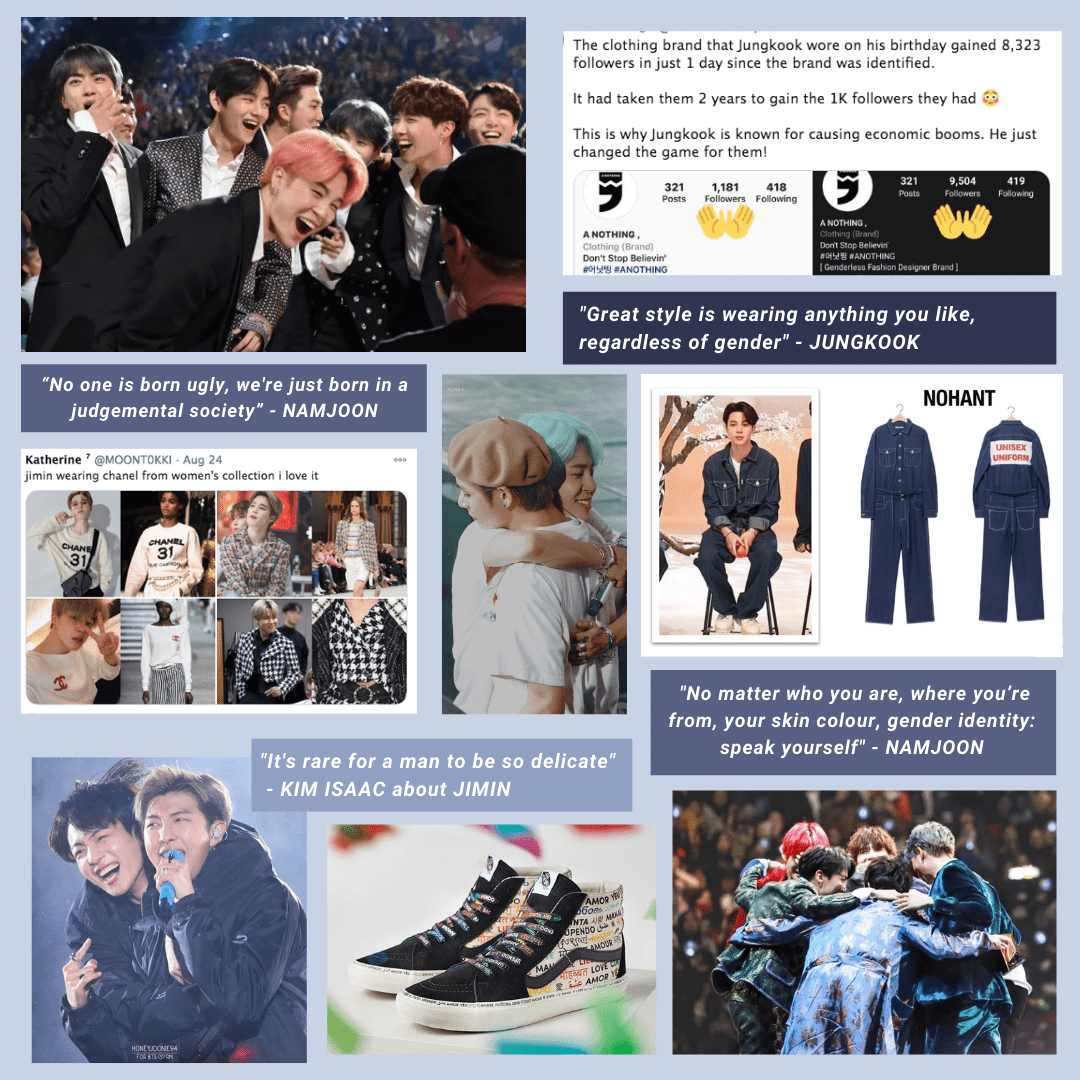[et_pb_section fb_built=”1″ _builder_version=”4.4.7″ hover_enabled=”0″ width=”75%” max_width=”75%”][et_pb_row _builder_version=”3.25″ background_size=”initial” background_position=”top_left” background_repeat=”repeat”][et_pb_column type=”4_4″ _builder_version=”3.25″ custom_padding=”|||” custom_padding__hover=”|||”][et_pb_text _builder_version=”3.27.4″ background_size=”initial” background_position=”top_left” background_repeat=”repeat”]Art and writing by Belle Murphy
Accentuated through their songwriting, group dynamic and authentic approach to style, there’s something refreshing about BTS’ approach to masculinity and self-identity. This article explores a number of ways these much-loved Korean idols are dismantling gender stereotypes and redefining hegemonic beauty standards, and ushering in a liberating new wave of masculinity and gender neutrality. The concept of masculinity in the entertainment industry, is further examined in greater detail in my earlier article.
Perhaps most poignantly, a number of BTS’ songs throughout their discography are written using gender-neutral terminology, including ‘Singularity’, ‘Serendipity’ and ‘Spring Day’. BTS’ Kim Namjoon explains that this decision was made because he believes the feelings illuminated in the chart-topping single ‘Serendipity’, “transcend genders, cultures and barriers between people”. Fans also noticed the subtle, yet meaningful change of pronouns in BTS’ official remix of Jason Derulo and Jawish 685’s ‘Savage Love’ earlier this year, further conveying BTS’ message of inclusivity and acceptance of gender fluidity. In addition, BTS’ leader Kim Namjoon (also known as RM) made an impassioned speech at the United Nations Youth Strategy Conference in 2018, encouraging fans and the broader community to embrace their own individuality, “no matter where you’re from, your skin colour, gender identity: speak yourself”.
The group’s strong emotional bond with one another is undoubtedly one of their most endearing attributes. It is illustrated through their closeness, both emotionally and physically – whether they’re holding hands, hugging, earnestly complimenting each other for their achievements or consoling each other when they’re emotional during awards ceremonies and concerts. To add to this charming dynamic, two of the members, Jimin and Taehyung (V), fondly call each other “soul mates”, and co-wrote a song called ‘Friends’ celebrating their special bond. The band’s modelling of open displays of affection and expression of emotions, is incredibly important for society to see, and contributes to breaking down potential stigma. In a recent interview with Esquire Magazine, Yoongi (known as Suga) expressed his perspective on the culture of defining masculinity by particular emotions and traits, confessing he is, “not fond of these expressions”. Continuing on, Yoongi explains, “many pretend to be okay, saying that they’re not ‘weak’, as if that [being emotional] would make you a weak person” and urges “society [to] be more understanding”. Beautifully expressed through the raw and nuanced lyrics on the self-produced eight-track record, BTS’ most recent album “BE” encapsulates the member’s inner dialogue, experiences with burnout and their mental health journey throughout the global pandemic. They have never shied away from conversations about mental health – further elaborated on in their films, which follow the Korean idols’ emotional journeys throughout each of their world tours.
BTS’ Jimin is widely admired for his progressive fashion ensembles, including his appreciation for silk scarves, striking eyeshadow looks, as well as his statement “unisex uniform” denim-boilersuit from Nohant. The Korean idol also regularly incorporates clothing items categorised as from “women’s collections” into his personal style. Jimin’s liberating character has also been recognised by Korean florist, Kim Isaac, who made a guest appearance in a BTS ‘Run’ episode. Hosting a floral-arranging workshop, he acknowledges that, “it’s rare for a man to be so delicate [like Jimin]”.
In an interview with Vanity Fair, after being featured on their 2019 Best Dressed List, Jungkook famously said that he considers great style to be “wearing anything you like, regardless of gender”. This sentiment is reflected in his consciously curated wardrobe, incorporating a range of lesser-known gender-neutral and unisex clothing labels. For instance, earlier this year Jungkook wore a casual outfit from a brand called A NOTHING, on his birthday Vlive (a popular communication channel for Korean idols and their fans) and has since made multiple public appearances sporting the clothing line. Prior to this, the genderless designer brand took two years to establish 1,000 followers on social media. They’ve since reached 17,800 followers on Instagram, which is a testament to the economic influence and power of the K-pop phenomenon.
BTS are renowned for raising a brand’s public profile, leading to brands instantly selling out of stock and, in some cases, sites crashing due to the overwhelming demand created through their endorsement. This sentiment was exemplified when photos of BTS’ Suga went viral on Twitter, after he was spotted wearing pro-LGBTQ sneakers – part of the limited-edition Vans collection celebrating New York’s diversity and different forms of love.
It is clear that the Korean idols are mindful of their incredible influence in shaping public opinions and global gender-norms. It is an influence BTS endeavour to use as a positive vehicle for change, reflected in their touching lyrics, inspirational speeches and expressive personal styles.
[/et_pb_text][/et_pb_column][/et_pb_row][/et_pb_section]


Leave a Reply